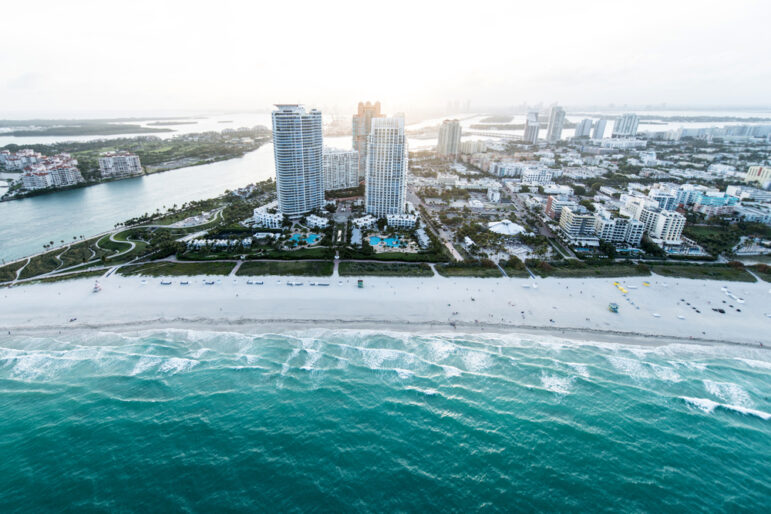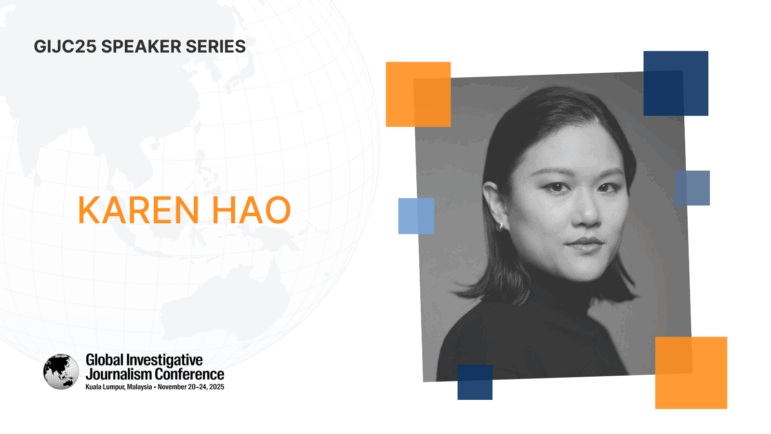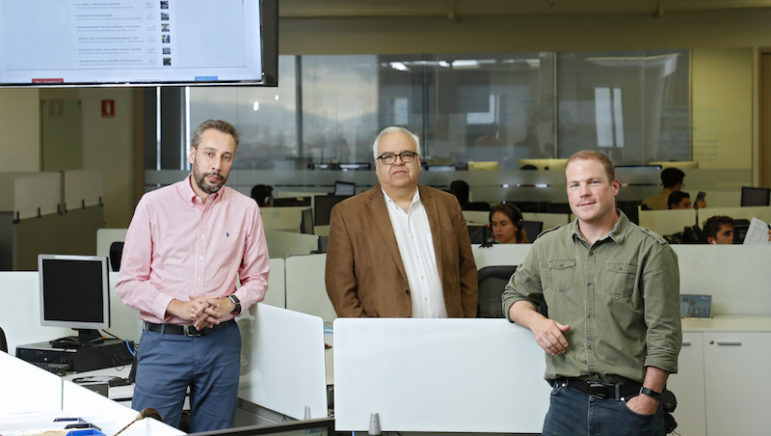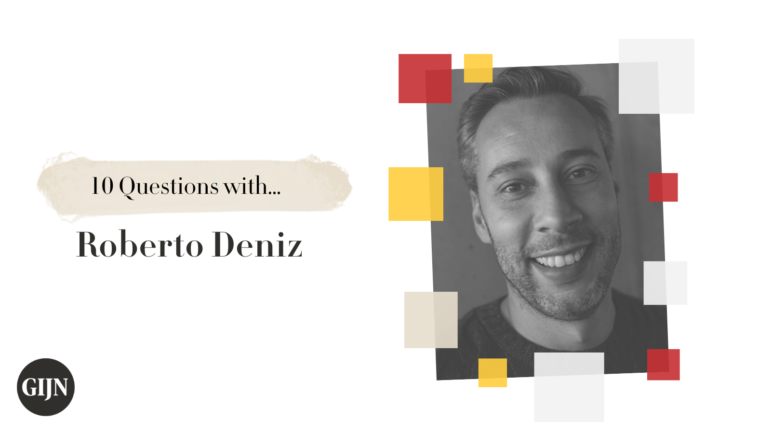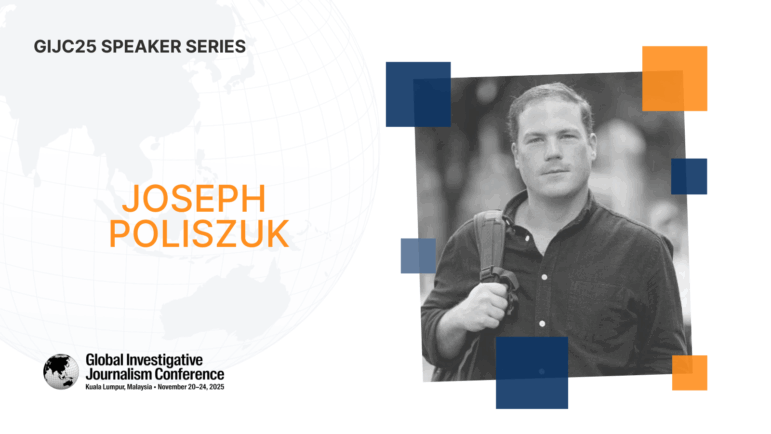

Image: GIJN
‘Journalism in Exile Has Been Somewhat Romanticized’: The Challenges of Being Forced to Investigate from Afar
Read this article in
Editor’s Note: Ahead of the Global Investigative Journalism Conference in Malaysia, GIJN is publishing a series of short interviews with a globally-representative sample of conference speakers. These are among the more than 300 leading journalists and editors who will be sharing practical investigative tools and insights at the event.
Having previously exposed abuses such as illegal mining and drug trafficking as a reporter for El Universal, Joseph Poliszuk has since led a trailblazing and courageous team as co-founder of Venezuela’s pioneering investigative journalism outlet Armando.info.
Despite being forced into exile, this newsroom has relentlessly investigated high-level corruption and human rights violations in Venezuela and elsewhere in Latin America, and employed innovative approaches ranging from the use of data-gathering algorithms to active cross-border collaboration and the pursuit of urgent, undercovered topics. Their follow-the-money investigations have included the Miami Nostro series that exposed secret US investments by hundreds of former Venezuelan military officers, and key revelations in Latin America’s vast Odebrecht corruption and money laundering scandal.
Poliszuk will share key insights on investigating oligarchs and managing projects from exile as a speaker at the 14th Global Investigative Journalism Conference in Malaysia (GIJC25). This is the second in a series of interviews with key speakers who will be in attendance.
GIJN: Of all the investigations you or your team have worked on, which has been your favorite, and why?
Joseph Poliszuk: I think that question is like asking a musician to choose their best song or album. For me, journalism is a way of life, and I’ve enjoyed every season of this series: from my first trip to the clandestine mines of southern Venezuela to, 20 years later, programming an algorithm to geolocate them. From tracing — through data journalism techniques — generals and colonels who, against the law, became the state’s biggest contractors, to exposing corruption — through traditional reporting — in the promised public works of Brazil’s Odebrecht in Venezuela. From documenting torture and systematic human rights violations in clandestine detention centers in Caracas — including Nazi-style practices such as Sippenhaft — to searching the country’s dusty physical archives for Nicolás Maduro’s elusive and symbolic birth certificate.
GIJN: What are the biggest challenges for investigative reporting in your country/region?
JP: Venezuela is a closed society, where there is no free access to public information, and fear extends from government sources to the most independent ones, who worry about reprisals against their families. That’s why I feel that, despite the good work being done, we still fall short: there are vast voids and information deserts in a media ecosystem that is practically non-existent. In many cases, we don’t even fully know how the state operates, the systematic human rights violations being committed, or the crimes carried out directly by those in power.
In this context, journalists face a mix of political pressure, legal harassment, and economic precarity. Independent teams are usually small, underfunded, and exposed to digital threats or intimidation. Authorities themselves are implicated in corruption cases and even in crimes against humanity. This makes sustainability a constant challenge: producing investigations that may take months or years while keeping the team safe and operational.
GIJN: What reporting tool, database, or technique have you found surprisingly useful in your investigations?
JP: In our work, we’ve advanced alongside technology: from structuring large databases and using machine learning to search through archives and massive leaks to designing algorithms to track satellite images. Technology is undoubtedly helpful and must be taken advantage of, but it is not the foundation of journalism. The principles remain the same, and everything depends on what we are investigating and what we want to find.
GIJN: What’s the best advice you’ve received from a peer or journalism conference – and what words of advice would you give an aspiring investigative journalist?
JP: I remember that, at the dawn of what came to be called “computer-assisted reporting” — long before the boom of “data journalism” — Gianina Segnini told us that the digital world is not so different from the physical one; just as an institution stores documents on paper, it also stores them on its servers. Starting from that idea, I use and flip the same advice to say that before thinking about technology — and its “little toys”— we need to be clear about what we want to prove, and only then choose the best methodology, whether digital or traditional. And in our experience, the best defense is doing the best possible work: biting into a topic and not letting go until we’ve pieced the story together.
GIJN: What topic blind spots or undercovered areas do you see in your region? And which of these are ripe for new investigation?
JP: I believe today’s journalism has developed some methodologies to uncover corruption and money laundering, but I feel we still fall short when it comes to tracing financial flows in depth, from accounting ledgers to crypto assets.
GIJN: Can you share a notable mistake you’ve made in an investigation, or a regret, and share what lessons you took away?
JP: I think journalism in exile has been somewhat romanticized. Thanks to technology, we’ve been able to continue our work from abroad, but we’ve also lost a great deal, starting with timing and direct observation, which are natural building blocks of journalism. I worry that, in our newsroom in particular and in Venezuelan journalism more broadly, much of that has been eroded — and I see it as a serious shortcoming. At the same time, exile has given us greater safety. Not long ago, I published a story about front men and overseas assets tied to one of the heads of Venezuelan intelligence — a piece that would have been reckless to release in Caracas and then go to bed peacefully that same night.
GIJN: What are you particularly looking forward to at GIJC25 in Malaysia, whether in terms of networking or learning about an emerging reporting challenge or approach?
JP: I am very interested in seeing what is being done and how investigative journalism is being carried out in Africa and Asia. In Latin America, we are in touch and follow the work of colleagues throughout the region, and we also keep an eye on experiences in Europe and the United States. But since the conference will take place in Malaysia this time, it will be especially interesting to listen, observe, learn, and share with colleagues from the other side of the world.
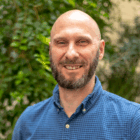 Rowan Philp is GIJN’s global reporter and impact editor. A former chief reporter for South Africa’s Sunday Times, he has reported on news, politics, corruption, and conflict from more than two dozen countries around the world, and has also served as an assignments editor for newsrooms in the UK, US, and Africa.
Rowan Philp is GIJN’s global reporter and impact editor. A former chief reporter for South Africa’s Sunday Times, he has reported on news, politics, corruption, and conflict from more than two dozen countries around the world, and has also served as an assignments editor for newsrooms in the UK, US, and Africa.





